In Iceland with Reykjavíkurdætur – the country’s first female hip-hop band who are feminists… because all groups should be
Katie Beswick went to meet 11 women who redefine what it means to be bandmates
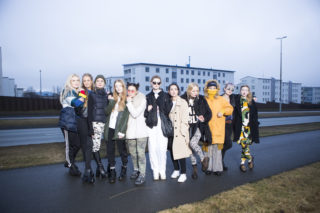
Katie Beswick went to meet 11 women who redefine what it means to be bandmates
Flying low over Iceland, it looks like a country that time forgot – like a digital reconstruction of a prehistoric landscape you might have seen on Time Team. The terrain is hard and incredible: rugged and moss green; pools of bubbling water and spiky mountain ranges dusted with snow. It is mostly uninhabited. There are no human settlements visible on the mainland, just clusters along the coast – tiny pockets of light illuminating the darkness – and no wildlife. “It’s pretty bleak,” I say to Salka Valsdóttir, a member of the hip-hop group I have flown in to interview, and she laughs. “Yes,” she says as we drive through Reykjavik in the dark, the windows steaming up as snow begins to fall outside. “Not very many beings can thrive here.”
This unforgiving landscape has given birth to Reykjavíkurdætur (Daughters of Reykjavik), a sixteen-strong female crew who have been creating ripples across the male-dominated Icelandic hip-hop scene with their explicit lyrics and electric performances. Salka has collected me from my hotel to join one of their meetings – a weekly event where the band discuss the future of their project, make decisions about upcoming opportunities and refine their vision and mission together, speaking about issues that affect them as a group, and especially as women.
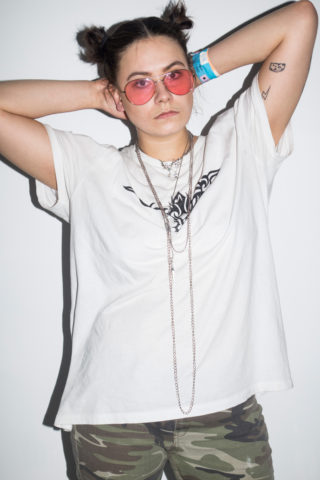
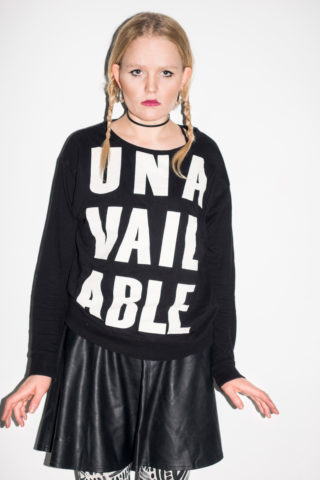
I arrive late, and the women are winding down. We’re in someone’s flat (I don’t quite catch whose) and it’s a warm, friendly chaos – the women are chatting and laughing over cups of tea; speaking in Icelandic with the fast, furious, emotionally charged spirit that characterises their music. Like the consciousness raising circles that emerged from the radical feminist movements of the 1970s, Reykjavíkurdætur share their own experiences and work together to find solutions to problems they face. This week, for example, they’ve spent a lot of time discussing motherhood.
Two of the women already have children and another is pregnant, and they are starting to think about how they can support one another as mothers within the framework of the band. And it’s not all talk: When I arrive, there is a baby burbling in the corner of the room – her mother has just left for a date and the rest of the group are taking care of her. “It’s what we do for each other!” They laugh, handing me a cup of tea and ushering me to a seat in the corner. “Baby needs a new daddy!”
“It’s something we’ve been talking about a lot,” Salka tells me. “We were thinking of getting a babysitter to come with us abroad. It’s important as a philosophy in general – to have that as a principle. Because we want to support motherhood. And the fact that somebody decides to have a baby concerns all of us. It becomes the responsibility of the whole band.”
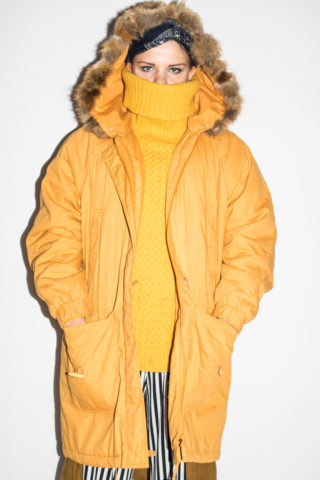
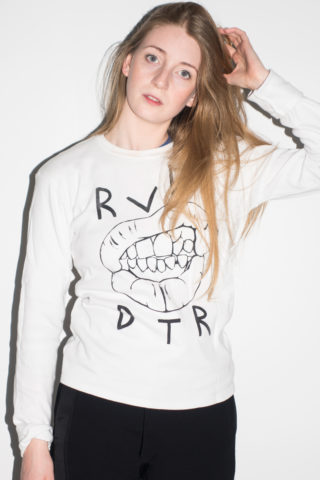
Steinunn Jónsdóttir, who is cheerful, blonde and herself the mother of a young boy, nods as she speaks over her band-mate (they do this a lot – interrupting one another as the conversation flows, making the job of recording the interview quite difficult). “If we are going to be part of a band we need to bring our babies with us, at least for the first year, or first six months, or if it’s a long trip. That’s going to be a priority.”
Reykjavíkurdætur was created in 2013 when Blær Jóhannsdóttir and Kolfinna Nikulásdóttir were heartbroken, unemployed and working in a hotel to make ends meet. “So,” Blær begins, jiggling the baby at her hips, “me and the mother of this child, we had a broken heart and we were both working at a hotel and we had nothing to do. And we sometimes got some weekends off and we went downtown and we drank a lot. So we needed some sort of outlet for our feelings. And also a way to feel big because we felt really small at that time – I think that was a part of it. Not for everyone but for us at least. It didn’t come out of… we didn’t talk about our broken hearts or anything. We always had fun, we were always rapping for each other. Sending each other some sort of raps. We had nothing to do while cleaning the toilets – just listening to Eminem. So finally we had this idea to hold a women’s rap night,” she pauses. “Katrín, you tell it from here.”
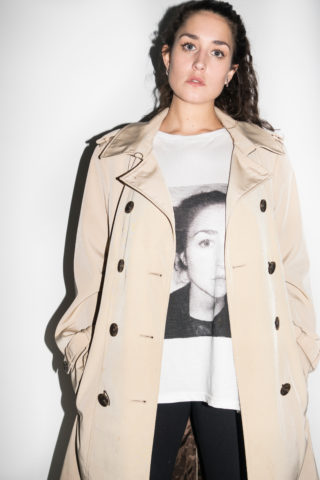
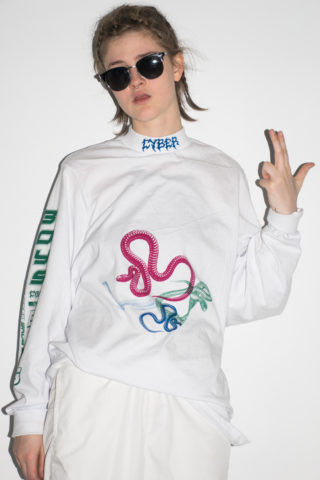
“Well,” Katrín Andrésdóttir says, “I remember this summer we were playing a festival – me and my sister Anna – we were actually in a band before Reykjavíkurdætur that was rapping, because we couldn’t sing. Easy solution, because we couldn’t sing and we wanted to be in a band and we had lots of stuff to say so we decided to rap. And we were performing at a festival where the band that Kolfinna was in at the time – they’re doing great, still – were playing. We were talking in the bus on the way back about rap, the whole way. And we were all noticing this common interest between us and many of the girls that we knew. Like, a growing interest in rap. And then a couple of days or weeks later Kolfinna contacted us and asked us to perform in this female rap night that they were having, where they had collected all the women they knew who were interested in rap or were writing lyrics, even though they were just beginners, and that’s how it started. It was supposed to be just a closed event for us to perform to each other but then, at the last minute, they decided to make it a public event, and everyone was so curious to see what was gonna happen, you know girls rapping. So, it became very popular straight away.”
Salka nods in agreement. “It was completely crowded, the cellar”
“Because it was so popular we held it again,” Katrín continues. “And then for the third rap night we decided to advertise it by making a song all together. And while we were filming the video someone came up to us – the song was called ‘Reykjavíkurdætur’, which means ‘Daughters of Reykjavik’ – and someone came up to us and was like ‘so what’s the name of your band?’ and I think it was Valdis who said ‘oh Reykjavíkurdætur’, and since then we were a band.”
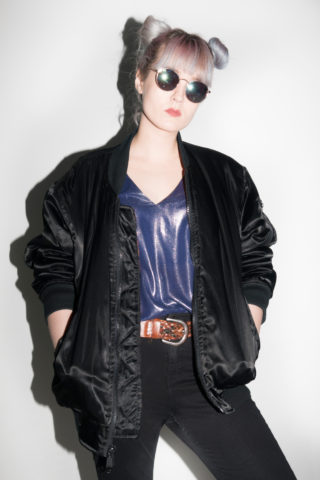
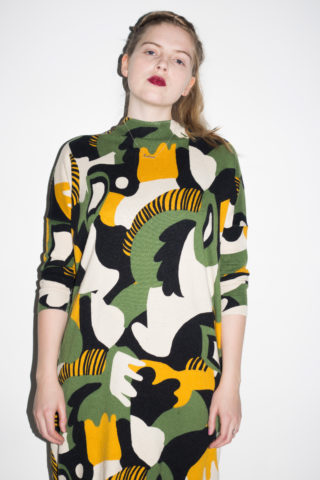
“Yes,” Steinunn interrupts, excitedly (if you’re finding it difficult to keep up with who exactly is saying what then you’re getting an accurate impression of what it was like at the meeting). “All of a sudden we were getting bookings and stuff but we didn’t even know we were in a band! It was just supposed to be kind of a thing to hype this event. And I think on the Facebook site it still says ‘we are having a women’s rap night on the 27th of December 2013 please come and see us.’”
“I remember you performed with us before you were in Reykjavíkurdætur,” Blær reminds Steinunn, “and I was like, ‘I know you want to be in the band, I know you do.’ And you were like, ‘No! I can’t handle this there’s too many of you.’ And then you performed with us and you were on the campsite and everyone was really drunk and you were like, ‘OK! I’ll be in the band.’ Because it was so much fun. It’s always so much fun on stage. But when we come together to perform it’s amazing.”
She turns back to me. “And at first it was like if you performed at a women’s rap night you could be part of Reykjavíkurdætur. But we had to stop that later because we started to be booked more often. It was hard. It was like, ‘are we thirteen or are we three [people]?’ You have to know a number. It was this last spring that we started to think of ourselves as a band, not as a collective, or an art platform or whatever.”
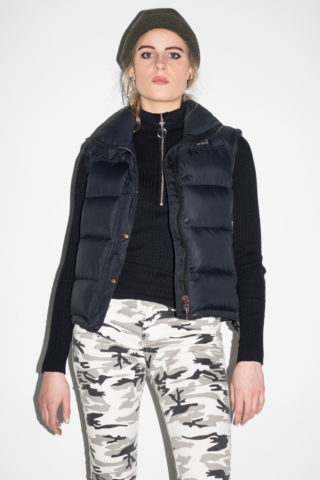
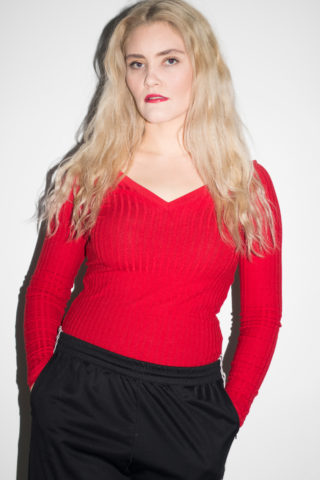
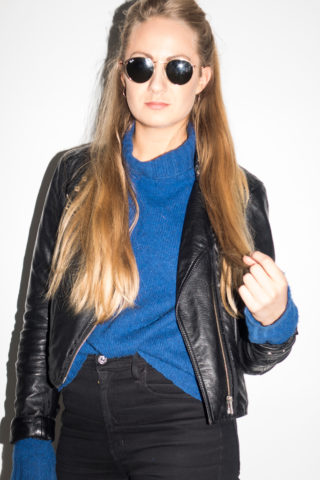
Although the women also work separately – several are in other bands and Katrín, a classical pianist, plays with indie-folk musician Sóley – there is a sense of collectivity that runs throughout their process. They are clear that this project is about collaboration. They enjoy finding different methods of working together.
“Maybe there is no best way [to work as a group],” Katrín tells me. “Like, it depends. For the first song, or the first three, we did all together; everybody had to make fifteen seconds of lyrics and just everybody did that and we mixed it together: this one comes after this one. And last summer we all met and everybody just threw in some words and we did one sentence at a time and just passed the computer around.”
“We also do duos, and trios and solo songs within the band,” Salka says. “Shows are usually the spotlight going around. So sometimes two people are in the spotlight doing a song that they wrote, while in the group songs we’ve tried to find methods of making songs we can all participate in. But then for the latest song we wrote, two of us wrote all the words and gave each person a verse, so it would be very flowing and well-constructed. Maybe we’ll try that with different girls, so it’ll be completely different.”
Firmly labelled as feminists by the media and with striking, political lyrics that include verses on the joys of anal sex, Reykjavíkurdætur have had a stratospheric impact on the Icelandic hip-hop scene – with the recent, crowd-funded album ‘RKV DTR’ nominated in the best hip-hop/rap category at the 2017 Icelandic Music Awards, and invitations to tour across the world. But it hasn’t always been easy to fit into the mainstream. “When we started there was no space for us,” they says, “and people who had been doing it for longer than us didn’t want us to do it. But we just took the space. And now we’re just part of the scene.”
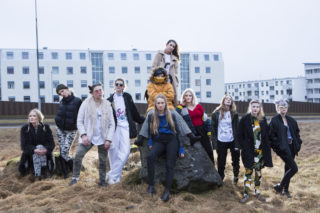
I wonder how far the reluctance to make space was because they were women. The girls laugh. “Oh yes. This is how we became so famous so quickly in Iceland. And we were all amateurs so it was very easy to criticise us very harshly. But we were also pioneers, because we were the only women in the Icelandic hip-hop scene and we were emerging when that scene was starting to grow. And it has been peaking now for the last two years.”
At one early show the band were pelted with cucumbers by a teenage audience, after a male rapper (who they decline to name) tweeted that Reykjavíkurdætur was ‘a nice idea, but it didn’t work.’ The women describe this as a defining moment in their careers. “After we were booed off stage we were in a backstage room and we were just like, ‘Ok. Now we really have to show them, we have to go even further, be even crazier, have our tits out in the next video.’”
The cucumber incident led to the creation of their record ‘Ógeðslegt’ (‘Disgusting’), which Salka describes as a “game changer.”
“It’s just us rapping about how cool we think we are,” Steinunn laughs.
But Salka disagrees. “We had a lot of attention and we had a lot of hate. A lot of people telling us what we should do. And we couldn’t have cigarettes in pictures because we were role models for young girls and all this. And we really, really quickly felt the pressure of that for a while. And we were really paranoid about what we did, and if we were corrupting all the children of Iceland.” She shakes her head. “[‘Ógeðslegt’] was just the first wave in this band. Let’s be women just doing whatever we want to do. To me it was the most feminist song we had made, being sixteen women just rapping about whatever we want, about nothing for seven minutes. We realised if we were going to have to be role models, maybe young girls don’t need role models that are in some kind of box. We are better role models for them by doing things that are not allowed by society. By rapping about nothing, or about anal sex.”
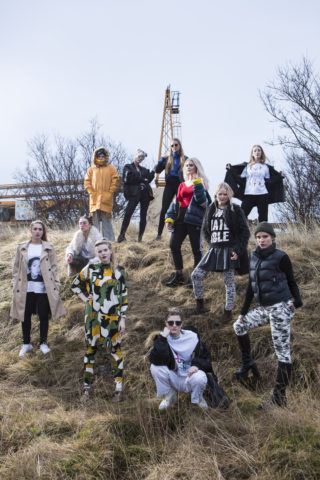
Salka stops mid-sentence – holds her hand up to halt the conversation for a moment, circling back to the idea that Reykjavíkurdætur’s feminist politics make them radical. “It would be very good if you could put in the interview that it would be very unusual not to be a feminist band. We get asked this a lot. And it makes no sense not to be a feminist. It feels weird to me that people label us as a feminist band; it bothers me.” She describes an interview at Eurosonic festival, where a journalist spent forty minutes interviewing them without once asking about the music. “I was like, ‘we have sat in an interview for 40 minutes now as a band that is playing at this music festival and you have not asked us about one song, or anything concerning that we are artists composing and writing lyrics and performing and thinking about that a lot. We have been working as musicians for almost four years and you haven’t asked us a single thing about that. To me that’s very unfeminist.’”
Katrín nods. “Every band should be a feminist band. Unless they are like ‘we hate women.’ We didn’t think, ‘oh we’re going to be a feminist band’, but we’re many women, we’re being loud in a male dominated space, talking about things we’re unhappy about – it was the audience and media that labelled us as feminist.”
Reykjavíkurdætur’s determination to do music on their own terms, and the wit and humour with which they approach their work is obvious in the energy of the sound – even though I can’t understand the lyrics. Not that comprehension necessarily matters to the girls. Their Facebook page has the tag “shlengideng”, a made-up nonsense word that captures the spirit with which they approach performance. “Who came up with shlengideng?” Salka asks. “Kolfinna? Because when we started rapping none of us had been doing it prior so we were all really bad at it. Often we would forget lyrics and stuff so we’d be like ‘shlengidengydeng, shlengidengy dang dang dang.’ So that’s why I think the webpage is called that. We can’t change it!”
Now though, they are no longer amateurs. The girls have honed their lyrics, content and flow to a place they feel proud of. The abrasive Icelandic language coupled with the rhythmic pace of the delivery is impressive; and it’s easy to see how Reykjavíkurdætur have started to break out on the international scene. I ask whether there is any pressure to perform in English now that so many of their bookings are abroad.
“We’ve been told you have to start rapping in English, so you can go to the States and stuff,” Salka explains. “So it’s like, yeah, and then we’re like maybe we should mix it up and stuff. But it’s rapping. And it’s playing with words. We’re so good at that in Icelandic.” She looks me straight in the eyes. “Seriously. You should hear us rap Icelandic, we’re so good. So it’s so much easier for us to do it like that. We can do much more, it’s more clever.”
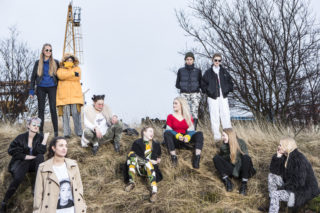
“But I think generally the audience is quite pleased with the Icelandic,” Katrín says. “I think as a live band we project the meaning through our energy and our stage performance and everything – and I think people get it, even when they don’t understand the words. And I think often we introduce the songs – we say what they are about before we start them so that people can get into the feeling. But with Icelandic also, the reason people enjoy listening to it, even when they don’t understand it, is it’s a very harsh language, it has a lot of rhythm in it. Also, Iceland is so ‘in’ right now, so people are ‘oh Icelandic this is cool.’”
They laugh for a while and one of the women stands to collect the empty tea cups, signalling that the meeting is almost over. Salka leans forward as I turn my recorder off, not quite ready to finish just yet. “I really like that people don’t understand what we’re saying. Not because I think that what we’re doing isn’t important, or isn’t good, but because I think that our energy and performance and the way we carry ourselves on stage translates very well. I think the kind of recognition we’ve gotten abroad has proved that. And also because we don’t have the choice of being, you know, preachers – telling people what to think or anything. We have to count on our effort and our presence being enough for people to want to learn what we’re saying. Or are interested enough to try and understand the message – and that’s happened a lot. And to me that is a perfect way to get your message across. Because you don’t have to, in any sense, try to force-feed it to people. You don’t have the choice. You have to trust the audience completely.”